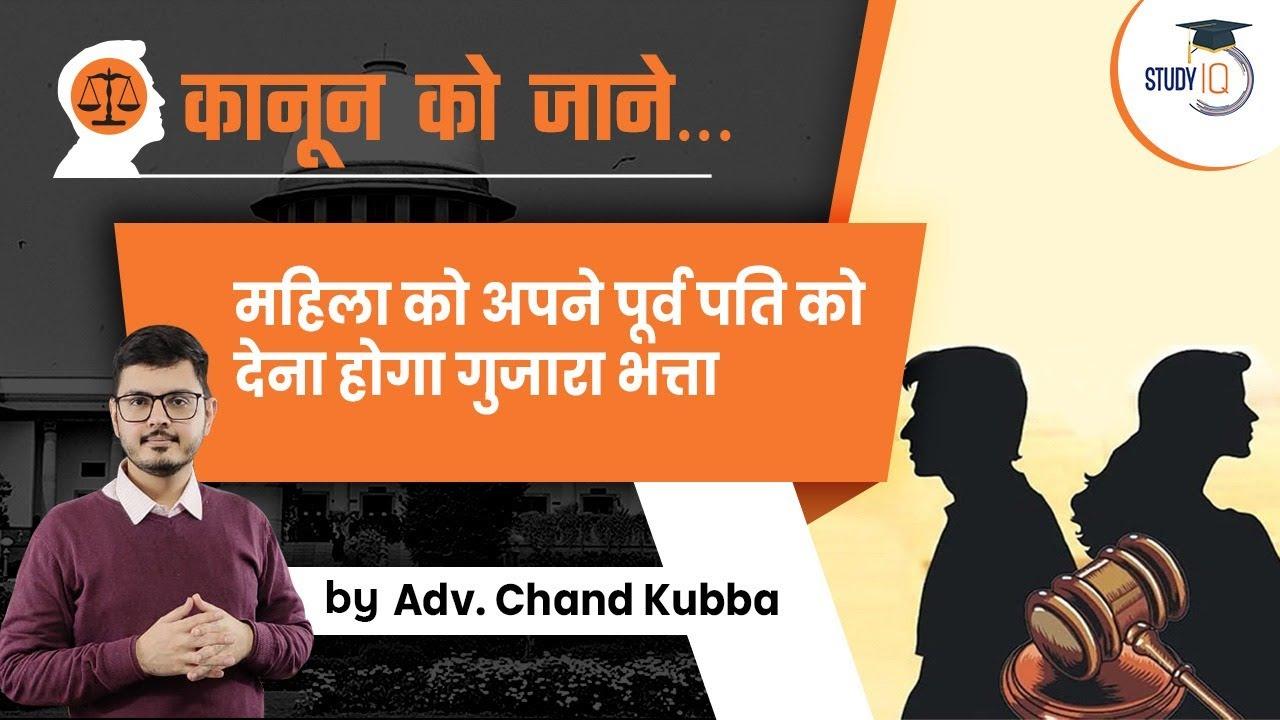Indian Judiciary & State GS Paper 1 Act and Amendment
News-
- Bombay High Court upheld two orders of the civil court in Nanded, directing a wife who is working as a teacher, to pay Rs 3,000 maintenance to her husband
- It also directed the school principal to deduct Rs. 5000 from her salary towards unpaid maintenance since August 2017.
- The court relied on Section 24 and 25 of the Hindu Marriage Act to state that they confer a right on the needy spouse to claim interim or permanent alimony, where a decree of restitution of conjugal rights or divorce has been passed.
Facts of the Case
- The couple married on April 17, 1992
- Were divorced in 2015, on the ground of cruelty alleged by the wife.
- After the divorce the husband filed a petition seeking perpetual alimony of Rs 15,000 per month from the wife.
- The husband claimed that he did not have any source of income while his wife was an M.A., B.Ed. and is employed at a University.
- He also claimed that in order to encourage the wife to obtain the degree, he managed the house, keeping aside his own ambition. The husband also cited his ill health possession of no immovable properties.
- However, the wife claimed that the husband was running a grocery shop as well as an auto rickshaw, and earns income by leasing out the same. Moreover, she also had the responsibility to care for their daughter.
Section 24
- Maintenance During the Pendency of Proceedings under this Act.
- It appears to the court that either the wife or the husband, has no independent income sufficient for her or his support…… it may, on the application of the wife or the husband, order the respondent to pay to the petitioner the expenses of the proceeding, and monthly during the proceeding such sum as, having regard to the petitioner’s own income and the income of the respondent, it may seem to the court to be reasonable.
Proceedings under Section 9 to 13
- 9 Restitution of conjugal rights
- 10 Judicial separation
- 11 Void marriages
- 12 Voidable marriages
- 13 Divorce
Section 25 in The Hindu Marriage Act, 1955
- Permanent alimony and maintenance
- (1) Any court exercising jurisdiction under this Act may, at the time of passing any decree or at any time subsequent thereto, on application made to it for the purpose by either the wife or the husband, as the case may be, order that the respondent shall pay to the applicant for her or his maintenance and support such gross sum or such monthly or periodical sum for a term not exceeding the life of the applicant as, having regard to the respondent’s own income and other property, if any, the income and other property of the applicant the conduct of the parties and other circumstances of the case, it may seem to the court to be just, and any such payment may be secured, if necessary, by a charge on the immovable property of the respondent.
Bombay High Court Observed-
- “The scope of Section 25, therefore, cannot be restricted by holding that on divorce / dissolution of marriage, the wife or the husband cannot bring such proceedings.”
- ‘’The scope of Section 25 of the Act of 1955 cannot be constricted by not making it applicable to a decree of divorce being passed between the husband and wife….The provision of maintenance / permanent alimony being a beneficial provision for the indigent (needy) spouse, can be invoked by either of the spouse, where a decree of any kind governed by Sections 9 to 13 has been passed and marriage tie is broken, disrupted or adversely affected by such decree of the court.”
- S.25(2)If the court is satisfied that there is a change in the circumstances of either party at any time after it has made an order under sub-section (1), it may at the instance of either party, vary, modify or rescind any such order in such manner as the court may deem just.
- S.25(3) If the court is satisfied that the party in whose favour an order has been made under this section has re-married or, if such party is the wife, that she has not remained chaste, or, if such party is the husband, that he has had sexual intercourse with any woman outside wedlock,it may at the instance of the other party vary, modify or rescind any such order in such manner as the court may deem just.






















 WhatsApp
WhatsApp